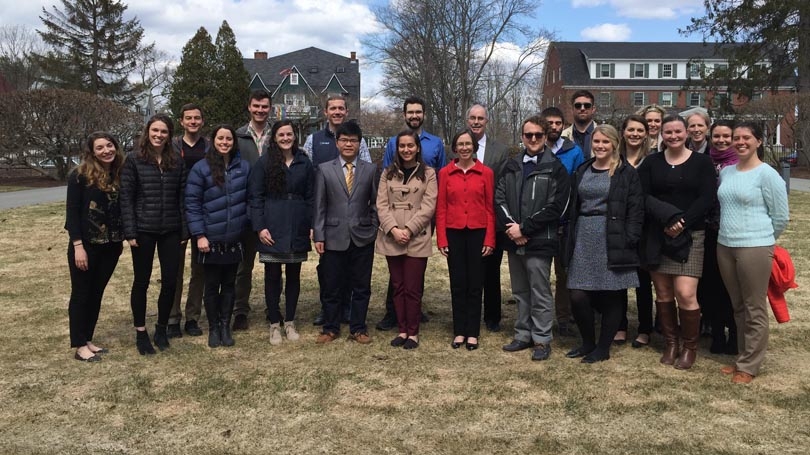
President Phil Hanlon '77 and Gail Gentes '77a met with leaders from the graduate and postdoc community over lunch
Dartmouth President Phil Hanlon '77 and Gail Gentes '77a welcomed leaders from graduate student organizations, postdoctoral fellowships, and the Graduate Student Council into the President’s residence for a luncheon on April 11, 2018. The diverse group of student leaders represented a wide array of programs and organizations, and everyone in attendance seemed eager to discuss important issues facing the Dartmouth graduate community.
After a delicious meal accompanied by conversation with President Hanlon, Gail Gentes, Dean of the School of Graduate and Advanced Studies, F. Jon Kull, and Assistant Dean of Graduate Student Affairs, Kerry Landers, the President invited students to participate in a thirty-minute question and answer session.
The graduate students’ main concerns were with housing opportunities for graduate students, integration of graduate students into the Dartmouth community, environmental sustainability efforts on campus, and mental health initiatives for graduate students.
President Hanlon acknowledged the frustration felt by the graduate community regarding a lack of housing on campus, stating that a lack of beds on campus was one of the challenges facing the Dartmouth community. When asked if North Park would revert back to graduate student housing or if graduate student housing on campus would be made available, President Hanlon said he did not see it happening in the next couple of years. He did, however, refer to efforts being made to expand Sachem Village in the future.
In regard to a question posed about the prevalence of depression, anxiety, and other mental-health illnesses in graduate students, the president responded, saying that improving and ensuring students’ mental health was one of the most serious challenges facing Dartmouth and other colleges around the country. He noted that Dartmouth’s capital campaign is focused on improving students’ mental health, and that Geisel School of Medicine was conducting funded research on the topic.
President Hanlon spoke at length when asked about his vision for the integration of graduate students and their wider role in the Dartmouth community, citing what he believes are the five key components and the heart and soul of Dartmouth’s institution: its faculty, its unwavering commitment to the liberal arts (meaning that Dartmouth aims to produce an education that is dedicated to a quality of mind rather than simply technical training), its profound sense of place, its role in transforming Hanover into a base camp for the rest of the world, and its, and its community’s adventuresome spirit. President Hanlon stated that these five components are the very core of the Dartmouth community and that he aims to optimize them now, and in the future.
He also remarked that the theme of Dartmouth’s investment follows three main goals: procuring talented faculty and students, maintaining and fostering the pioneering spirit, and creating a campus without boundaries by aiming for a seamless integration of faculty, students, and graduate students.
Responding to a question regarding Dartmouth’s efforts to create a sustainable campus, President Hanlon cited Dartmouth’s goal of converting the campus’ power plant to a renewable source by 2025. He acknowledged that climate change is one of the largest challenges facing our society today and that Dartmouth’s academic investment in the topic illustrates its commitment to tackling the problem.
As the session came to a close, President Hanlon asked, “What could make your life better as a grad student?” Several attendees cited better management of parking on campus-specifically Dewey lot; better housing opportunities; and since the college seems to be investing in and relying on Sachem Village as its main graduate living community, more convenient transportation to and from Sachem Village.
Both the lunch and the question and answer session illustrated President Hanlon’s commitment to graduate students and his dedication to ensuring that every facet of Dartmouth’s community continues to progress, evolve, and improve.